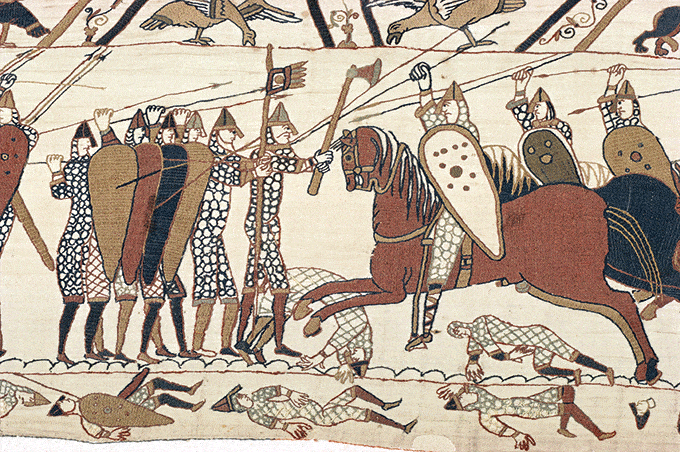
Salamis Was History’s Most Consequential Battle
In 480 BC, Persia’s king Xerxes set out to conquer Greece. After overcoming a Spartan force at Thermopylae, the Persians advanced on and seized a nearly deserted Athens, razed the city’s walls, and burned the place the ground. They then assembled their navy of about 600 to 800 warships south on the beaches south of Athens, near the island of Salamis to the west. An allied Greek navy of about 375 warships, mostly Athenian, awaited them, guarding the eastern entrance of a strait separating Salamis from the Greek mainland.
The Greek navy was under the nominal command of the Spartan Eurybiades, but in practice, the true commander was the Athenian Themistocles. Athens’ Greek allies wavered, and called for a retreat from Salamis. Themistocles convinced them to stay by threatening that the Athenians would defect to the Persians if the allies refused to fight. However, as it was clear that the other Greeks’ commitment was shaky, Themistocles decided to force a battle as soon as possible.
He sent king Xerxes a secret message, claiming friendship, and informing him that the Greeks were demoralized. To bag them, Themistocles advised, the Persians should send a naval detachment to block the western exit of the strait, then attack from the east. The bottled up Greeks would then either surrender, or put up a poor show. Either way, Xerxes would emerge victorious.
Xerxes followed Themistocles’ advise, and the Greeks went into a panic upon awaking the next day to discover that the Persians had bottled them up in the strait. Themistocles calmed them down, and devised a plan whereby the Greeks retreated far up into the narrows. The Persians had sought a battle with their ships on an east-west line facing Salamis, which would have allowed them to attack the Greeks on a broad front, and take advantage of their numerical superiority to overlap and envelop their foes. Instead, Themistocles drew them into a battle whose lines ran north-south, along the narrow front of the strait’s width. That did much to negate the Persian numerical superiority at the point of contact, and had the added effect of drawing the maximum number of Persian ships into the restricted waters, before the Greeks counterattacked.
By getting the Persians to cram their huge navy into a tight space, Themistocles turned the Persians’ numerical superiority into a disadvantage. Persian ships found themselves packed in an ever tighter space, fouling each other and unable to properly maneuver. All the while, more and more Persian captains, seeking to impress Xerxes, who was watching the battle from a nearby hilltop, rushed in, adding their ships to the growing jam ahead.
To add to the Persians’ woes, the waters off Salamis were tricky, and while the Greeks knew their secrets, the Persians did not. All those factors combined to bring about a decisive Greek victory, in which the Greeks lost about 40 ships, while the Persians lost about 300. Casualties were even more lopsided than the ship losses, as many Greeks who ended up in the water swam to the safety of nearby Salamis. Persians, by contrast, were either shot by arrows as they neared Salamis, or were slaughtered as soon as they reached shore.
There is no other battle in history that, had it gone the other way, would have resulted in as radically different a world. Western history is rooted in Greek civilization, particularly the Athenian contribution to that civilization. The height of Athenian culture and civilization, featuring an explosion in the arts, literature, philosophy, and democracy, occurred in the decades after the victory at Salamis.
Greece would have become a Persian satrapy if the Greeks had lost at Salamis. There would have been no independent Hellenic civilization to eventually seed that of the West. Instead of a history drawing upon Greek civilization, Western history might have become an extension of Persian civilization and culture. The ripple effects might have included no Christianity as a major religion. Christianity only became a world religion after it escaped its Jewish roots, and fused the teachings of Jesus with the Hellenism of the Roman East. A knock on effect of that would have been no Islam as a major religion. There had been a significant Christian presence in Arabia for centuries before Islam, exerting considerable influence upon the locals. Indeed, many viewed Islam in its earliest days as just another Christian heresy, because of significant overlap between it and Christianity.
____________
Where Did We Find This Stuff? Sources & Further Reading
Ancient Warfare – The Battle of Salamis
Art of Battle, The – Battle of Yarmuk, 636
Atomic Heritage Foundation – Bombings of Hiroshima and Nagasaki, 1945
BBC – What Happened at the Battle of Hastings?
Encyclopedia Britannica – Siege of Vienna
Forgotten Islamic History – The Battle of Yarmuk, Khalid Bin Waleed’s Greatest Victory
History of War – Battle Leipzig (The Battle of Nations), 16-18 October 1813
Lanning, Michael Lee, The History Place – The Top Ten Battles of All Time
Thought Co. – Attila the Hun at the Battle of Chalons

